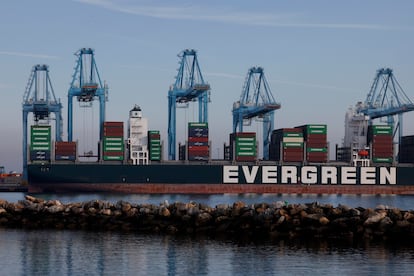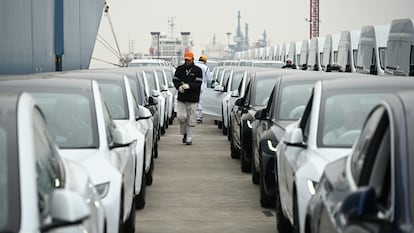China retaliates with countermeasures against Trump’s tariffs
Beijing announces levies of up to 15% on imports of US products, such as oil and large cars, an investigation into Google and restrictions on exports of critical minerals


China may be on holiday for the Lunar New Year. But the response to Donald Trump’s additional 10% tariffs on Chinese imports has been immediate, with a battery of measures in different areas. Starting February 10, Beijing will impose additional taxes of 15% on coal and liquefied natural gas from the United States, and 10% on crude oil, agricultural machinery, large-capacity cars and pickup trucks. The authorities in the Asian country have also announced an antimonopoly investigation into Google and the imposition of export controls on several critical minerals such as tungsten and tellurium, used in the production of semiconductors and batteries, respectively.
The Chinese government has also filed a complaint against the U.S. measures before the dispute settlement mechanism of the World Trade Organization (WTO) and has decided to include two U.S. companies, PVH Corp. (owner of brands such as Tommy Hilfiger and Calvin Klein) and Illumina Inc, dedicated to biotechnology, on the country’s list of unreliable entities, which gives it a free hand to impose punitive measures.
The additional U.S. tariffs, which are in addition to those previously imposed on Chinese products, “constitute an act of unilateralism and trade protectionism,” a spokesman for China’s Ministry of Commerce said in a statement on Tuesday, justifying the decision to take the case to the WTO. “These actions seriously undermine the rules-based multilateral training system, damage the foundation of economic and trade cooperation between China and the United States, and disrupt the stability of global industry supply chains.”
Trump’s swipe and China’s automatic response sound like what they are: the first shots fired in a new trade battle between the two superpowers, after the one the tycoon started in 2018, during his first term in office. The tariffs on the People’s Republic are the first he has imposed in this second term, after he suspended tariffs on neighboring countries until March 4 after speaking with the president of Mexico, Claudia Sheinbaum, and the prime minister of Canada, Justin Trudeau. Trump assured in any case that he plans to speak in the next few hours with the president of China, Xi Jinping, which could put the measures on hold, if they are able to reach an agreement.

Beijing’s response has so far been limited and targeted, in a warning that hits various sectors but is not a generalized tariff, which seems to indicate a certain willingness to negotiate on the part of the world’s second largest economic power to avoid a full-scale battle. The tariffs announced by China would apply to about $20 billion (about €19.37 billion) in annual imports, compared to $450 billion (€435.85 billion) in Chinese goods subject to Trump’s tariffs, according to an estimate by the firm Capital Economics, reported by Reuters.
The announced controls on minerals was one of the possible responses being considered by many analysts. China has announced that it will control exports of items related to tungsten, tellurium, bismuth, molybdenum and indium, four of which are considered “critical minerals” by the U.S. Geological Survey. These are resources with numerous applications and key to industrial development, modern technologies and the energy transition. The decision has been taken “in order to safeguard national security and interests and to comply with international obligations, such as non-proliferation,” as justified by the Ministry of Commerce in a statement.
The announcement of an antimonopoly investigation against Google may seem surprising, as the company’s search engine and most of its applications are blocked in China. Parent company Alphabet, however, benefits from Chinese advertisers abroad and the Asian giant’s phone makers make widespread use of the Android operating system.
Beijing has also lashed out at the justification given by Washington for imposing the new duties: the alleged lack of Chinese cooperation in the fight against drug trafficking. It has assured that a trade war could jeopardize police cooperation in this field.
Sign up for our weekly newsletter to get more English-language news coverage from EL PAÍS USA Edition
Tu suscripción se está usando en otro dispositivo
¿Quieres añadir otro usuario a tu suscripción?
Si continúas leyendo en este dispositivo, no se podrá leer en el otro.
FlechaTu suscripción se está usando en otro dispositivo y solo puedes acceder a EL PAÍS desde un dispositivo a la vez.
Si quieres compartir tu cuenta, cambia tu suscripción a la modalidad Premium, así podrás añadir otro usuario. Cada uno accederá con su propia cuenta de email, lo que os permitirá personalizar vuestra experiencia en EL PAÍS.
¿Tienes una suscripción de empresa? Accede aquí para contratar más cuentas.
En el caso de no saber quién está usando tu cuenta, te recomendamos cambiar tu contraseña aquí.
Si decides continuar compartiendo tu cuenta, este mensaje se mostrará en tu dispositivo y en el de la otra persona que está usando tu cuenta de forma indefinida, afectando a tu experiencia de lectura. Puedes consultar aquí los términos y condiciones de la suscripción digital.








































